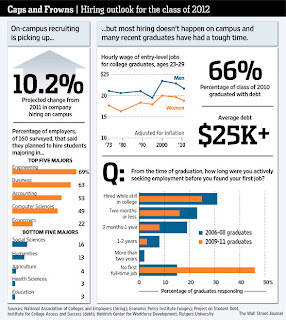Before the recession struck in late 2007, a 2.6% job vacancy rate was associated with an unemployment rate of 5.7%. Since then, the same number of vacancies is more associated with an 8.2% unemployment rate.
According to the article,
"Moves likes that ... suggest that the labor market has become less efficient at matching workers with with jobs, something that can happen when workers don't have the skills that employers need."That's a reasonable explanation. I read a lot these days about how recent graduates will have a hard time finding jobs. [Source]

However, I don't think that's the entire story. The increased use of screening software by human resources personnel seems also to contribute to the quandry. [Source]
When the recession hit in 2007, a lot of companies has to cut back on their human resources. Consequently, they came to rely on application screening software. The problem is there didn't seem much allowance made between "preferred" candidate attributes and "required" ones. In one situation, a company screened 25,000 applicants for a standard engineering position. Their HR said no one was qualified; one applicant came close -- "he had been told he was perfect for a given position—except for the fact that his previous job title didn't match that of the vacancy."
The article quotes Neal Grunstra, president of a temporary-staffing company, who calls this "looking for a unicorn," and it's something I really identify with. In my undergraduate days at the University of Hawaii, I served as an editor at the school newspaper, despite the fact I was not a journalism major. I just happened to be good at it. After graduation, the first full time job I found was as a computer technician at a law firm, and that was only with the help of a friend of mine. I was not a computer science major, nor did I have any professional certifications -- again, I just happened to be good at that kind of work. When the IT manager asked me how I would solve a problem, I actually came up with a few ideas she herself hadn't though of, and I got the job. Even today, there are a lot of private sector jobs where I just don't fit the bill, despite being a reasonably smart guy with decent people skills and work habits. For this reason, I like being in the Army, at least as a subordinate. I'm getting paid, so I *have* to have a job. It might not be my dream job every time, but in my experience, they haven't been that bad either.

No comments:
Post a Comment